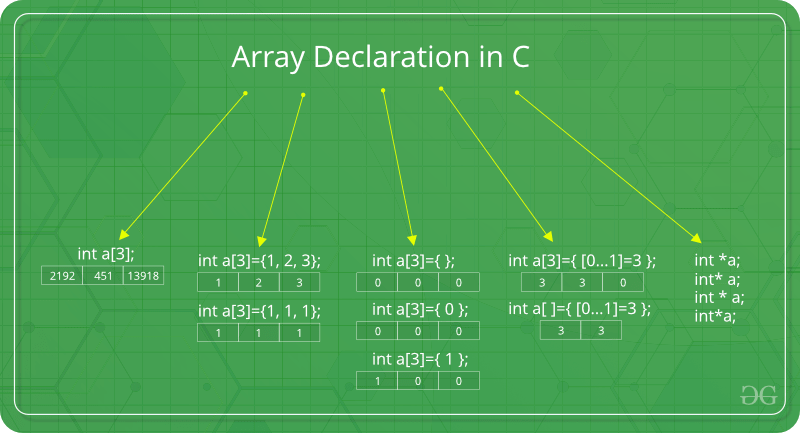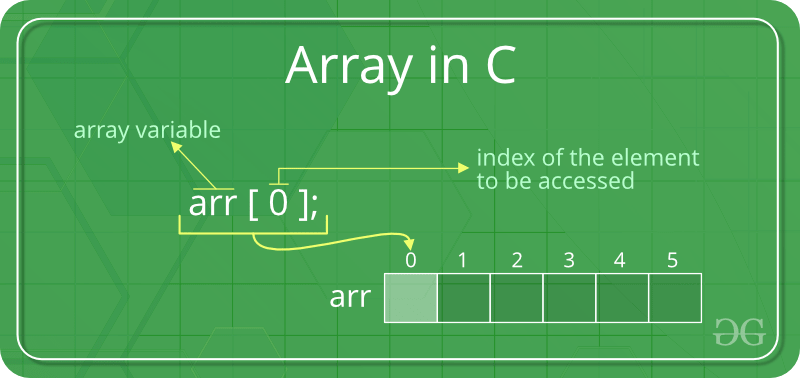Array
- It is a group of variables of similar data types referred to by a single element.
- Its elements are stored in a contiguous memory location.
- The size of the array should be mentioned while declaring it.
- Array elements are always counted from zero (0) onward.
- Array elements can be accessed using the position of the element in the array.
- The array can have one or more dimensions.
An array in C/C++ or be it in any programming language is a collection of similar data items stored at contiguous memory locations and elements can be accessed randomly using indices of an array. They can be used to store the collection of primitive data types such as int, float, double, char, etc of any particular type. To add to it, an array in C/C++ can store derived data types such as structures, pointers etc. Given below is the picture representation of an array.

Why do we need arrays?
We can use normal variables (v1, v2, v3, ..) when we have a small number of objects, but if we want to store a large number of instances, it becomes difficult to manage them with normal variables. The idea of an array is to represent many instances in one variable.
Advantages:-
- Code Optimization: we can retrieve or sort the data efficiently.
- Random access: We can get any data located at an index position.
Disadvantages:-
- Size Limit: We can store only the fixed size of elements in the array. It doesn’t grow its size at runtime.
Array declaration in C/C++:

Note: In the above image int a[3]={[0…1]=3}; this kind of declaration has been obsolete since GCC 2.5
There are various ways in which we can declare an array. It can be done by specifying its type and size, initializing it or both.
Array declaration by specifying the size
#include <stdio.h> int main(void){ // Array declaration by specifying size int arr1[10]; // With recent C/C++ versions, we can also // declare an array of user specified size int n = 10; int arr2[n]; return (0);} |
Array declaration by initializing elements
// Array declaration by initializing elements#include <stdio.h> int main(void){ int arr[] = { 10, 20, 30, 40}; // Compiler creates an array of size 4. // above is same as "int arr[4] = {10, 20, 30, 40}" return (0);} // This code is contributed by sarajadhav12052009 |
Array declaration by specifying the size and initializing elements
#include <stdio.h> int main(void){ // Array declaration by specifying size and initializing // elements int arr[6] = { 10, 20, 30, 40 }; // Compiler creates an array of size 6, initializes first // 4 elements as specified by user and rest two elements as // 0. above is same as "int arr[] = {10, 20, 30, 40, 0, 0}" return (0);} |
Advantages of an Array in C/C++:
- Random access of elements using the array index.
- Use of fewer lines of code as it creates a single array of multiple elements.
- Easy access to all the elements.
- Traversal through the array becomes easy using a single loop.
- Sorting becomes easy as it can be accomplished by writing fewer lines of code.
Disadvantages of an Array in C/C++:
- Allows a fixed number of elements to be entered which is decided at the time of declaration. Unlike a linked list, an array in C is not dynamic.
- Insertion and deletion of elements can be costly since the elements are needed to be managed in accordance with the new memory allocation.
Facts about Array in C/C++:
- Accessing Array Elements:
Array elements are accessed by using an integer index. Array index starts with 0 and goes till the size of the array minus 1. - The name of the array is also a pointer to the first element of the array.

Example:
#include <stdio.h> int main(){ int arr[5]; arr[0] = 5; arr[2] = -10; arr[3 / 2] = 2; // this is same as arr[1] = 2 arr[3] = arr[0]; printf("%d %d %d %d", arr[0], arr[1], arr[2], arr[3]); return 0;} |
Output
5 2 -10 5
No Index Out of bound Checking:
There is no index out of bounds checking in C/C++, for example, the following program compiles fine but may produce unexpected output when run.
// This C program compiles fine// as index out of bound// is not checked in C. #include <stdio.h> int main(){ int arr[2]; printf("%d ", arr[3]); printf("%d ", arr[-2]); return 0; |
Output
211343841 4195777
In C, it is not a compiler error to initialise an array with more elements than the specified size. For example, the below program compiles fine and shows just a Warning.
- C
#include <stdio.h>int main(){ // Array declaration by initializing it // with more elements than specified size. int arr[2] = { 10, 20, 30, 40, 50 }; return 0;} |
Warnings:
prog.c: In function 'main':
prog.c:7:25: warning: excess elements in array initializer
int arr[2] = { 10, 20, 30, 40, 50 };
^
prog.c:7:25: note: (near initialization for 'arr')
prog.c:7:29: warning: excess elements in array initializer
int arr[2] = { 10, 20, 30, 40, 50 };
^
prog.c:7:29: note: (near initialization for 'arr')
prog.c:7:33: warning: excess elements in array initializer
int arr[2] = { 10, 20, 30, 40, 50 };
^
prog.c:7:33: note: (near initialization for 'arr')
- Note: The program won’t compile in C++. If we save the above program as a .cpp, the program generates compiler error “error: too many initializers for ‘int [2]’”.
The elements are stored at contiguous memory locations
Example:
// C program to demonstrate that// array elements are stored// contiguous locations #include <stdio.h>int main(){ // an array of 10 integers. // If arr[0] is stored at // address x, then arr[1] is // stored at x + sizeof(int) // arr[2] is stored at x + // sizeof(int) + sizeof(int) // and so on. int arr[5], i; printf("Size of integer in this compiler is %lu\n", sizeof(int)); for (i = 0; i < 5; i++) // The use of '&' before a variable name, yields // address of variable. printf("Address arr[%d] is %p\n", i, &arr[i]); return 0;} |
Output
Size of integer in this compiler is 4 Address arr[0] is 0x7fff7a02db20 Address arr[1] is 0x7fff7a02db24 Address arr[2] is 0x7fff7a02db28 Address arr[3] is 0x7fff7a02db2c Address arr[4] is 0x7fff7a02db30
Another way to traverse the array
#include<stdio.h> int main(void){ int arr[6] = {11, 12, 13, 14, 15, 16}; // Way 1 for(int i = 0; i < 6; i++) printf("%i ", arr[i]); printf("\n"); // Way 2 printf("By Other Method: \n"); for(int i = 0; i < 6; i++) printf("%i ", i[arr]); printf("\n"); return (0);} // This code is contributed by sarajadhav12052009 |
Output
11 12 13 14 15 16 By Other Method: 11 12 13 14 15 16
Array vs Pointers
Arrays and pointers are two different things (we can check by applying sizeof). The confusion happens because the array name indicates the address of the first element and arrays are always passed as pointers (even if we use a square bracket). Please see the Difference between pointer and array in C? for more details.
What is a vector in C++?
A vector in C++ is a class in STL that represents an array. The advantages of vectors over normal arrays are,
- We do not need pass size as an extra parameter when we declare a vector i.e, Vectors support dynamic sizes (we do not have to specify size of a vector initially). We can also resize a vector.
- Vectors have many in-built functions like removing an element, etc.
To know more about functionalities provided by vectors, please refer to vector in C++ for more details.

